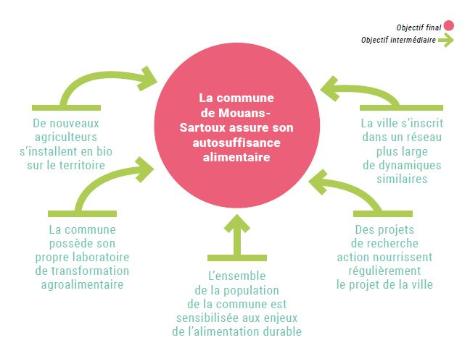France, Mouans-Sartoux : The Sustainable Food Education House
Boosting mobilization and disseminating success stories
January 2019
Fondation Daniel et Nina Carasso (FDNC)
Towards a Europe of territorial food systems?
This study is extracted from the analysis of twenty-two French and Spanish projects related to new food models, all highlighting different challenges.
In Spain, governance is being built, while French food systems are looking for solutions to change scale. But in both countries, accessibility remains the weak link. In 2016, Mouans-Sartoux is launching the Maison d’éducation à l’alimentation durable (MEAD) project. In 2012, it was the first town of more than 10,000 inhabitants to switch to 100% organic and local catering. This success has been a positive lever for food governance in the area. The municipality is betting that what is good locally can be good on a larger scale elsewhere, provided that the necessary tools are created to disseminate ideas and actions that help to concretely change the approach to food policies.
The MEAD
By creating the House of Education for Sustainable Food (MEAD), Mouans-Sartoux is taking a new step towards the sustainability of its food policy. The opening of this centre will boost territorial mobilisation and disseminate its successes. This project is part of the town’s Agenda 21, which aims to achieve food self-sufficiency. MEAD’s first function is to ensure the development of the actions initiated: the installation of a municipal agricultural board and a processing laboratory, the installation of new farmers, assistance in structuring the marketing of production and, again, raising awareness of sustainable food. It will be responsible for identifying the levers of success based on the positive experiences of the municipality. The priority target groups are collective catering and families. The mission entrusted to the MEAD also includes experimenting with new ways of development and sharing innovations with other territories. The MEAD is led by a project manager and steered by a committee of elected representatives, resource persons and citizens. Each partner brings a specific and complementary expertise. The association Un Plus Bio provides technical expertise and communication. Involved in the creation of an observatory of organic products in canteens, the Lascaux programme joins the group. Students from the University of Nice Geoazur and Skema Business School provide the academic knowledge. The company GrAINES (Graines d’agriculteurs innovants nourrirants entreprenants et soutenus par les consommateurs) deals with the installation and land issues. The project also draws on the experiences of the European territorial cooperation programme Urbact.

The five pillars of the Mouans-Sartoux Sustainable Food Education House
The Maison de l’éducation à l’alimentation durable (MEAD) is a « place » for formalising and perpetuating Mouans-Sartoux’s food policy. It is based on five pillars that feed into the commune’s food self-sufficiency strategy, which has been in place for several years. Teaching, research-action, communication, the actions cover all fields. This complementarity should enable the town to maintain the course of its food policy.
An agricultural management system: controlling the supply of canteens… directly!
The mad cow crisis triggers the commitment of the town of Mouans-Sartoux for a more sustainable food supply. The elected representatives and their teams very quickly wanted to supply the municipal canteens with products from organic and local agriculture. As the offer is not structured in the Alpes-Maritimes territory, the town hall and its partners are studying the possibility of producing, under management, a part of the food intended for the canteens. In 2010, the first potatoes are harvested. In spring 2011, a farmer is hired. Today, the farm covers 85% of the vegetable requirements of the Mouans-Sartoux canteen. In addition to supplying organic products, it is a real educational resource for children and elected officials alike.
The commune preserves and develops agricultural land.
The food strategy of the commune of Mouans-Sartoux leads the elected representatives to work for the maintenance and development of agricultural land. The commune is taking action by actively working on the Local Town Planning Plan. The agricultural surface area has tripled.